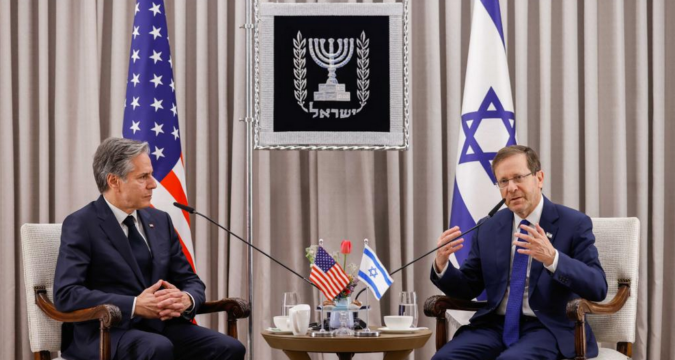
Secretary of State Antony Blinken is in Israel to discuss a U.S.-sponsored cease-fire proposal with Hamas to end 10 months of fighting in Gaza. He will hold meetings with Israeli President Isaac Herzog, Prime Minister Benjamin Netanyahu, and Defense Minister Yoav Gallant.
U.S. negotiators, led by CIA Director William J. Burns, presented a “bridging” proposal to both parties, aiming to conclude negotiations this week. However, Hamas officials dismissed Biden’s claim and accused Israel of shifting the terms of negotiations, accusing Netanyahu of the same.
The US-backed deal, backed by Qatar and Egypt, includes a six-week cease-fire, the release of Israeli hostages and Palestinian detainees, and the withdrawal of Israeli forces from Gaza’s major population centers.
Israel’s insistence on maintaining a military presence along the Philadelphi Corridor between Egypt and Gaza and the establishment of checkpoints to inspect Palestinians returning to their homes in northern Gaza remain key sticking points in the Israeli-Palestinian conflict. Netanyahu’s office insists on continuing to remain in the Corridor as a security precaution.
Netanyahu has come under fire from Hamas for allegedly stalling negotiations and creating roadblocks to a deal to extend the conflict. In addition to calling for a reduction in Israeli military presence along the Philadelphi Corridor, the “bridging” proposal calls for the Palestinian Authority to oversee Israeli administration of the Rafah crossing, which connects Gaza with Egypt. Although there is still debate surrounding the idea, the Biden administration considers the differences to be “bridgeable.”
Israeli Prime Minister Netanyahu has expressed flexibility in the talks with the Palestinian Authority, stating that they can and cannot be flexible. State Department spokesman Vedant Patel stated that Blinken will push for the conclusion of the deal, which would achieve a cease-fire in Gaza, release hostages, distribute humanitarian aid, and establish regional stability conditions.
A possible cease-fire between Israel and Hamas in Gaza is uncertain due to ambiguities in its language. After releasing most hostages, Israel and Hamas would negotiate a permanent cease-fire. However, if talks fail, Israel could resume its military operations in Gaza. Hamas spokesman Sami Abu Zuhri argues that there are no guarantees or commitments to stop the war after implementing the first phase of the agreement.
Negotiations over the killing of Hamas leader Ismail Haniyeh and Hezbollah commander Fuad Shukr in Lebanon are threatened by Iran and Hezbollah attacking Israel. Israel has not confirmed or denied its role in Haniyeh’s killing but has privately told U.S. officials. Blinken will emphasize the need for regional cooperation to avoid escalation.
Blinken visited Israel as British and French counterparts left the country, warning about the risks of a full-scale regional war. British Foreign Minister David Lammy and French counterpart Stéphane Séjourné expressed concern about growing Israeli settler violence in the West Bank. For the two European powers, who hadn’t traveled together since 2011, the visit was unusual. They also expressed concern about the potential spiraling conflict.
Here are some more details
Iran’s acting foreign minister, Ali Bagheri Kani, has stated that it has the right to respond to the killing of Haniyeh on its soil, as Iran and Hamas have blamed Israel for the incident, raising concerns over an upcoming Israeli assault.
In the midst of a polio outbreak, Israel is working with UNICEF and the World Health Organization to supply Gaza with over a million additional immunizations. The Gaza Health Ministry reported that some children in the enclave have polio-like symptoms, and one case has been confirmed. The WHO reported that polio vaccination rates in Gaza have dropped from 99% to 86%.
Gaza’s civil defense authorities have struggled to respond to 15,000 distress calls since the war began due to movement restrictions, fuel shortages, and targeting of rescue teams and equipment. Repeated evacuation orders have pushed civilians into a humanitarian zone.
A British Foreign Office official, Mark Smith, resigned in protest of the UK’s arms sales to Israel, expressing concerns about potential complicity in war crimes. The Foreign, Commonwealth, and Development Office (FCDO) stated the UK is committed to upholding international law.
The Gaza Health Ministry reports 40,099 deaths and 92,609 injuries since the war began, with women and children being the majority of dead. Israel estimates 1,200 civilian deaths in Hamas’s attack on October 7 and 331 soldiers killed since the military operation began.